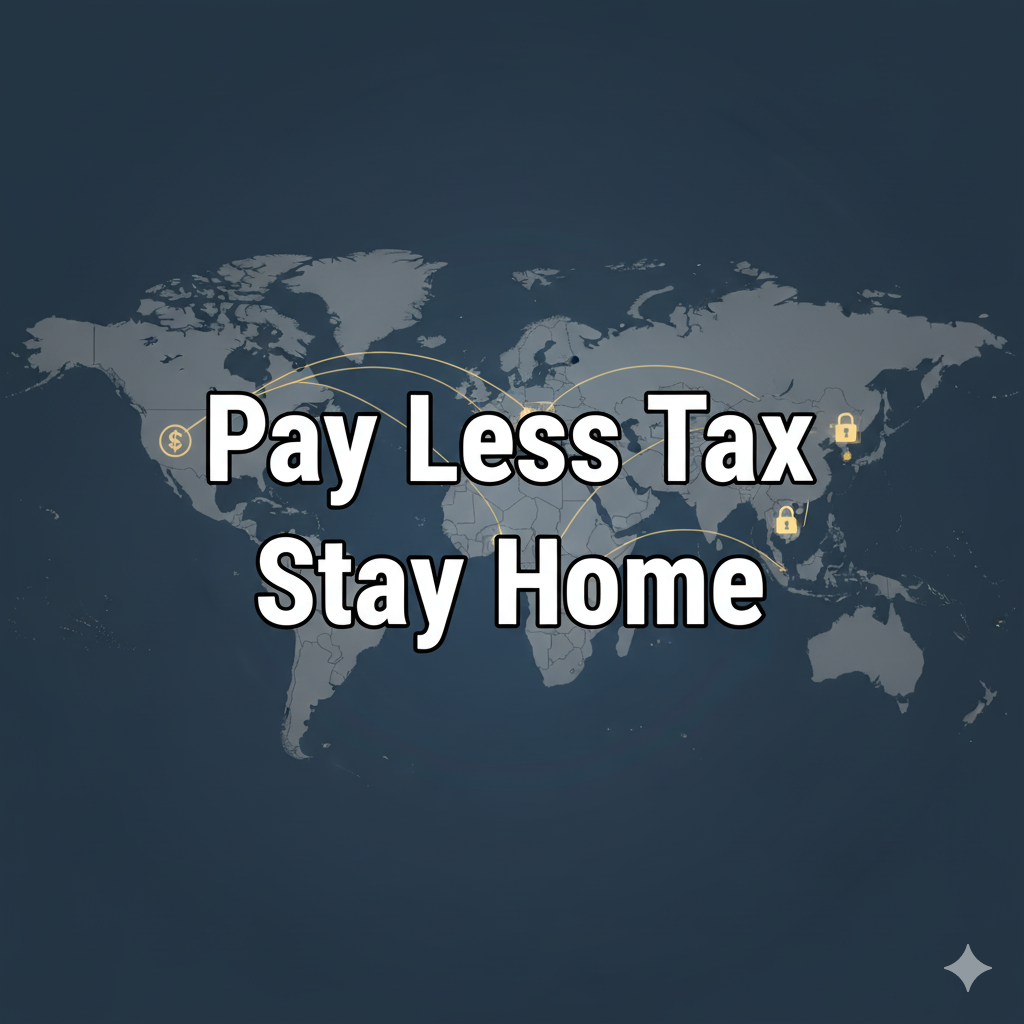The Legal Way to Pay Less Tax Without Leaving Your Country
How Global Entrepreneurs Use Holding Companies to Control Profits, Stay Compliant & Build Wealth Internationally

Introduction
Most entrepreneurs assume that to reduce taxes, they have to move abroad — to Dubai, Malta, or some tax-free haven. The truth is, you don’t need to change residency to create a globally optimized structure.
Today’s founders are using foreign holding companies, intellectual property (IP) licensing, and inter-company agreements to decide where profits accumulate — while staying fully tax-compliant at home.
This is how international founders, digital agencies, and SaaS builders expand across borders — without breaking a single law.
1. Think Like an Owner, Not a Local
The biggest shift is mindset. Small businesses think domestically; global entrepreneurs think structurally.
Instead of running everything through one local company, they divide ownership and operations. The key idea is separation — between the person, the operating business, and the entity that actually holds the value.
Here’s what that might look like:
You live in Sweden. Your holding company is incorporated in Cyprus. Your Swedish AB licenses your brand or IP from that Cypriot holding and pays it royalties or dividends.
Profits now sit offshore — not in your personal account — giving you control over when and how to extract them.
This approach isn’t about hiding money; it’s about following international tax law intelligently. When done with proper compliance, it’s 100 percent legal under OECD and EU frameworks.
2. The Core Concept: Legal Tax Optimization
The foundation of this model is corporate separation. You remain tax resident in your home country, but your company structure becomes global.
It’s built on four pillars:
- A foreign holding company that owns your local business.
- Licensing agreements transferring rights to use your IP or brand.
- Controlled profit flows through legitimate inter-company payments.
- Legal separation of management and ownership.
This isn’t new. Multinationals like Apple, IKEA, and Spotify have used versions of this model for decades. The only difference is scale — digital entrepreneurs can now access the same tools.
3. Step 1 — Create a Foreign Holding Company
Your first move is to establish a holding company in a strategic jurisdiction — a country that combines a competitive corporate tax rate, clear regulations, and strong treaty protection.
Popular choices include Cyprus, the Netherlands, Estonia, and the United Arab Emirates. Cyprus is known for its 12.5 percent corporate tax rate and robust EU legal framework. The Netherlands offers excellent treaty coverage and predictable tax rulings. Estonia taxes profits only when they are distributed. The UAE allows 0 percent tax on most foreign income and easy repatriation.
Once incorporated, the foreign holding owns your local operating company.
If structured properly, this transfer is tax-neutral because most countries have double-taxation treaties that prevent profits from being taxed twice.
4. Step 2 — Control Where Profits Accumulate
The next step is to decide where profits live.
Your local company pays royalties, management fees, or dividends to the foreign holding. These payments are legal business expenses, reducing taxable income at home.
For example, if your Swedish company earns one million euros in profit, it might pay two-hundred thousand euros in IP fees to its Cypriot parent. The Swedish company is taxed only on the remaining eight-hundred thousand euros. The two-hundred thousand euros now sit within the Cyprus holding, untaxed until you withdraw it personally.
That money can be reinvested, used to fund expansion, or saved for a more tax-efficient payout later.
It’s not avoidance — it’s deferral within the rules.
5. Step 3 — Delay or Structure Payouts
Once profits sit inside the holding, you choose what to do with them.
You might reinvest in new ventures, fund other subsidiaries, or extract dividends when it’s strategically optimal. Timing is everything — by managing distribution, you decide when taxation occurs.
This flexibility lets entrepreneurs scale internationally while maintaining full compliance at home.
6. Beyond Tax: The Hidden Advantages
While tax optimization grabs attention, the true strength of this setup lies in the long-term structural benefits.
Asset Protection
Separating ownership from daily operations shields your valuable assets. Trademarks, patents, and retained earnings inside the holding are insulated from local lawsuits or business risks.
If your operating company faces bankruptcy or legal trouble, your holding — and the assets it owns — remain untouched.
Exit Planning
Selling a holding company is often more tax-efficient than selling a local business directly. Many jurisdictions allow participation exemptions, meaning share sales can be partially or entirely tax-free.
This makes international exits cleaner, simpler, and cheaper.
Scalability
A holding structure allows you to add subsidiaries across regions, manage licensing centrally, and work with investors worldwide.
You’re no longer limited to your country’s legal borders.
7. Why It’s Legal
All of this works because it aligns with international tax rules — not against them.
The framework depends on substance and documentation, not secrecy.
The key compliance principles are:
- The holding must have real activity — a registered office, local directors, and board decisions made in its jurisdiction.
- All payments between entities must be arm’s-length, meaning priced as if between unrelated parties.
- Each transaction must have proper contracts, invoices, and transfer-pricing reports.
- Controlled Foreign Corporation (CFC) rules must be respected, declaring offshore profits when required.
- Strategic control must happen abroad, not from your home office.
When these conditions are met, tax authorities recognize the structure as legitimate. It’s not a loophole — it’s law.
8. Common Mistakes to Avoid
Many entrepreneurs trip up by skipping formalities. The most common errors include:
- Creating a “paper” company with no real office or staff.
- Charging unrealistic royalties or management fees.
- Mixing personal and corporate accounts.
- Running all decisions from the home country.
- Ignoring local reporting or CFC declarations.
Regulators from London to Stockholm apply the principle of substance over form — meaning if your company only exists on paper, they can disregard it.
Professional legal and accounting advice is essential from day one.
9. Real-World Models
Spotify, founded in Sweden, channels much of its international IP through a Dutch entity. IKEA’s complex but lawful structure is centered in the Netherlands. Thousands of small European and Middle-Eastern founders use Cypriot or Estonian holdings to manage global royalties.
These setups aren’t secret. They’re standard corporate architecture, publicly registered and fully compliant.
10. How to Set It Up Safely
To establish your own international structure, you’ll need a few essential pieces in place:
- A reputable corporate services firm in your chosen jurisdiction.
- Inter-company contracts drafted by tax lawyers.
- Transfer-pricing reports to justify fees and royalties.
- Local directors who conduct real meetings abroad.
- Accounting, audit, and compliance filings in both jurisdictions.
Once everything is documented and approved, you can run your operations globally while remaining a domestic tax resident — fully within the law.
Conclusion
You don’t have to flee your country to achieve financial freedom.
You only need to stop thinking like a local — and start structuring like an owner.
By combining foreign holdings, licensing, and profit control, you decide where money accumulates, how it’s managed, and when it’s received.
This is the quiet architecture behind global wealth — legal, compliant, and effective.
When ready, gather your information and consult an international tax lawyer. The right structure gives you control not just over profits, but over the future of your business.

Harsh Gupta is an international strategist helping entrepreneurs and investors legally minimize taxes, protect assets and build freedom through second residencies, passports and offshore banking—having guided hundreds of clients across EU, North America and Asia toward global mobility and long-term asset protection.